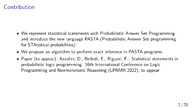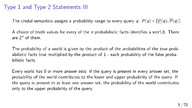 | EasyChair Smart Slide | User Guide/Log in |
| Home |

Probabilistic Logic Programs under the distribution semantics (PLPDS) do not allow statistical probabilistic statements of the form 90% of birds fly, which were defined Type 1 statements by Halpern. In this paper, we add this kind of statements to PLPDS and introduce the PASTA (Probabilistic Answer set programming for STAtistical probabilities) language. We translate programs in our new formalism into probabilistic answer set programs under the credal semantics. This approach differs from previous proposals, such as the one based on probabilistic conditionals as, instead of choosing a single model by making the maximum entropy assumption, we take into consideration all models and we assign probability intervals to queries. In this way we refrain from making assumptions and we obtain a more neutral framework. We also propose an inference algorithm and compare it with an existing solver for probabilistic answer set programs on a number of programs of increasing size, showing that our solution is faster and can deal with larger instances. --- NOTE: this is the original paper submitted and accepted at the 16th International Conference on Logic Programming and Non-monotonic Reasoning (LPNMR). It will be published in the proceedings of LPNMR so it must not be published on CEUR. ---





















